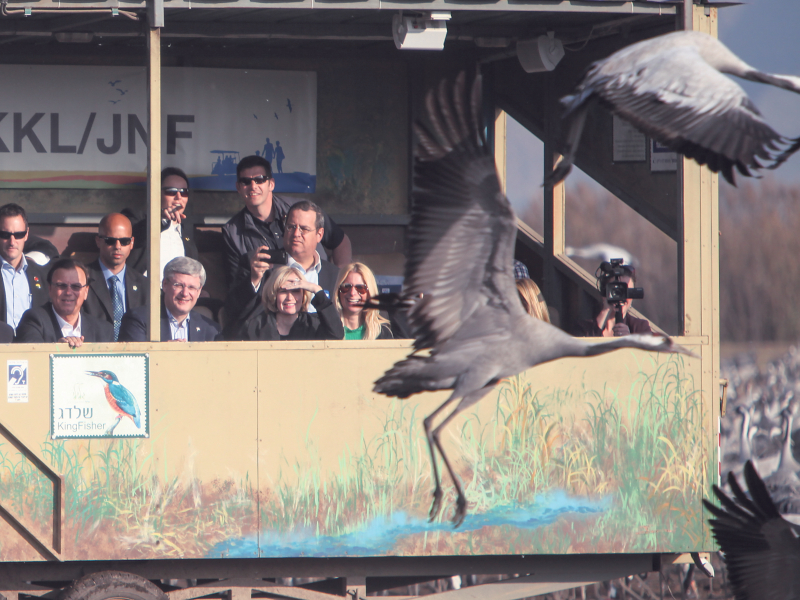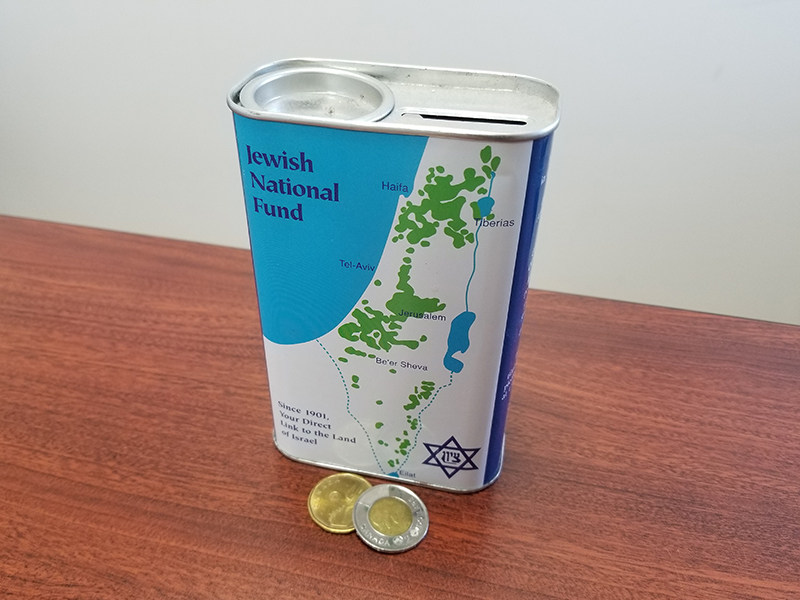The Jewish National Fund of Canada (JNF) is defending itself against a highly critical article about its fundraising that was published by the CBC earlier this month.
The Jan. 4 online article by the CBC’s Evan Dyer alleged that the JNF, one of Canada’s oldest Jewish charities that’s best known for its tree-planting and environmental work in Israel, has been the subject of a Canada Revenue Agency (CRA) audit over a complaint that it used charitable donations to build infrastructure for the Israel Defense Forces (IDF), “in violation of Canada’s tax rules.”
The article claimed that JNF has funded projects on Israeli army, air and naval bases. “While no law bars a Canadian citizen from writing a cheque directly to Israel’s Ministry of Defence, rules do ban tax-exempt charities from issuing tax receipts for such donations, and also ban donors from claiming tax deductions for them,” the article read.
According to the CBC, documents from JNF Canada and its Israeli parent organization, Keren Kayemeth LeIsrael (KKL-JNF), show that charitable donations from Canada flowed to projects at several military bases. These included outdoor fitness areas, developing a new training base, upgrading an existing auditorium for solider intake and new mess hall facilities at two air force bases.
The CBC cited CRA rules for charities operating outside Canada, stating that “increasing the effectiveness and efficiency of Canada’s armed forces is charitable, but supporting the armed forces of another country is not.”
It said JNF told its donors last year that it had been under audit by the CRA and that it had stopped funding those military projects in 2016.
In a statement to The CJN, JNF Canada CEO Lance Davis said the charity is “continuing to collaborate with the CRA on its review of our activities, and as a result we are limited in what we can say for the time being.”
Davis said that in keeping with the JNF’s mission to improve the quality of life in Israel, it has, “in the past, carried out projects of a charitable nature that indirectly involved the IDF. Many of these projects were for the benefit of children and youth, such a playgrounds and parks.” He said the projects were carried out on land owned by the IDF, but that JNF Canada’s charitable funds never flowed to the IDF.
He said these expenditures represented less than one per cent of JNF’s spending over the past decade.
At the time, JNF believed the projects complied with Canadian law because they were charitable in nature and were mainly intended to help children, Davis said. The JNF did not know the projects might be subject to CRA criticism because they were on land owned by the IDF, he added.
“When it came to our attention several years ago that the indirect association with the IDF may be misconstrued or criticized by the CRA, we stopped them,” Davis’ statement went on. “We no longer carry out projects located on IDF land. JNF Canada operates in accordance with CRA regulations governing its status as a charitable organization.”
Davis said the CBC story “seems to have been inspired by allegations made by Independent Jewish Voices (IJV) Canada, longstanding opponents of JNF Canada, the sponsors of the ‘Stop JNF Canada’ and strong supporters of the BDS campaign.”
READ: JEWISH NATIONAL FUND OF CANADA AUDITED OVER USING DONOR MONEY FOR IDF-LINKED PROJECTS
IJV has long opposed the charitable status of JNF. In 2017, IJV filed a complaint against JNF with federal authorities. At 85 pages, it details a litany of charges, including that JNF’s activities contravene the Income Tax Act, international law and CRA guidelines, as well as engage in discriminatory practices in Israel for selling and leasing land only to Jews. It asked that its charitable status be revoked.
The CBC also touched on a decades-old issue – that some JNF projects in Israel have stretched across the 1949 armistice line “into occupied West Bank territory,” contrary to long-standing Canadian foreign policy and rules for charities.
It cited JNF’s Canada Park project, saying that “occupied land forested by the JNF was enclosed on the Israeli side of the barrier Israel built to separate its citizens from the Palestinian population in the West Bank.”
Davis replied that with regards to projects “in disputed territory,” JNF is committed to continuing to work with the CRA “to ensure we are in full compliance.” He referred to a 2015 opinion piece in The CJN written by Alan Baker, Israel’s former ambassador to Canada, which argued that the land on which Canada Park sits was “never part of any Palestinian state or entity.”
The CBC article also took the JNF to task over its governance and transparency. “JNF Canada operates in compliance with the Canada Income Tax Act,” Davis stated. “JNF has Israeli staff on site to direct our projects in Israel and regularly reports on our activities. We take pride in our donor relations program and are in the process of enhancing our efforts.”
However, Charity Intelligence, a Toronto-based watchdog that monitors and rates hundreds of Canadian charities in several categories, gives JNF Canada below-average scores.
The average grade of the 750 Canadian charities the organization rates is “B.” When it comes to donor accountability, JNF received a “C-minus,” based on its public reporting of the work it does and the results it achieves.
For financial transparency, JNF Canada gets zero out of three because it doesn’t disclose its audited financial statements on its website.

Kate Bahen, managing director of Charity Intelligence (CI), told The CJN that 81 per cent of charities in Canada post their audited financial statements online.
“JNF never has,” Bahen said. “We have analyzed JNF since 2011 and every year we have to do a request for information with the Charities Directorate (of CRA) to receive the audited financial statement.
“This is very simple for a charity to do, especially a large charity – to post a PDF on its website.”
She said JNF is “less informative than most charities in Canada.”
An analysis conducted by CI shows that JNF Canada’s administrative costs are 17 per cent of its revenues, while fundraising costs are 27 per cent of donations. For every dollar donated, 56 cents goes to the cause. “This falls outside of CI’s reasonable range,” the organization states on its website.
The reasonable range for how much of each dollar raised goes to the cause is 65 to 95 cents, Bahen said.
Bahen also took the JNF to task for not providing a breakdown of how its donations are spent, whether for trees, irrigation, education or projects on military bases.
In a reply to CI’s findings, Davis said transparency “is a much bigger topicthan fundraising ratios.” He said JNF is “extremely transparent” because it is “a donor directed” charity, meaning it does not have an allocations committee that disburses undesignated funds.
He said that when a donor gives to JNF, it is to a specific project, whether rehabilitating a forest destroyed by kite terror, a trauma centre for children in Sderot, efforts to glean farmers’ fields to provide fresh produce, or helping to construct a specialized dental clinic for children with the most severe special needs.
“Donors pick their projects and the funds are flowed to them,” Davis explained.
Furthermore, fundraising ratios vary year to year according to the timing of collecting pledges and donations from JNF’s Negev dinners. Expenses, Davis said, are relatively flat and also vary in part due to the costs associated with producing eight to 10 Negev dinners across the country. Administration costs also vary annually, “but within reason.”
“We have a budget and finance committee which reviews our expenditures and reports to the executive and board of directors,” Davis said.
He pointed out that in 2016, JNF Canada’s revenue was $29 million, its programming and administrative costs were $2.9 million, and its fundraising expenses were $3.4 million, resulting in a fundraising ratio of just over 21 per cent. “These results are in keeping with industry benchmarks and are more reflective of our performance,” Davis said.
“I am personally committed and am working with our CFO and executive board to find ways to work more efficiently as well as to increase our revenue streams,” he added.

The CBC article noted that JNF has had strong relations with successive Conservative and Liberal governments. Among its most recent projects in Israel are the Stephen J. Harper Hula Valley Bird Sanctuary in the Galilee and John Baird Park in Sderot, which was named for Canada’s minister of foreign affairs from 2011 to 2015. Last July, Ralph Goodale, Canada’s minister of public safety, planted a tree at the JNF’s VIP Tree Planting Centre in Jerusalem.
The CRA can neither confirm nor deny whether a registered charity is currently under audit, has been selected for audit or has previously been audited, spokesperson Alexandre Igolkine told The CJN.
Canadian courts have stated that some activities may not be charitable when carried on in a different country, he said. “The courts have also established that a charity’s purposes and activities must not violate officially declared and implemented Canadian public policy,” he added.
*The above updates an earlier version of this story with additional quotes from the JNF.*







